
Compare AI Voice Assistants Across Brands: Top 7 Options for E-commerce in 2025
Find the right AI voice assistant for your store. Compare pricing from $0.006 per request to $2,500/month based on your business size and needs.

Written by
Adam Stewart
Key Points
- Cost ranges: Enterprise solutions start at $2,500/month vs budget options at $0.006/request
- Language support varies: Google offers 95+ languages, others cover fewer
- Match features to your size: Small stores need basics, enterprises need advanced tools
Choosing the right AI voice assistant can make or break your e-commerce customer experience. When you compare AI voice assistants across brands, the differences in features, pricing, and capabilities become clear. With voice commerce projected to reach $62 billion in 2025, this decision matters more than ever. This guide breaks down the seven best options, their multilingual capabilities, pricing models, and which businesses they serve best.
The global voice AI agents market is growing at 34.8% annually, expected to reach $47.5 billion by 2034. Meanwhile, 74% of consumers now use conversational voice assistants during some part of their shopping journey. Whether you're running a small boutique or managing a large-scale retail operation, understanding these platforms will help you pick the solution that fits your budget and goals.
Quick Comparison: Compare AI Voice Assistants Across Brands at a Glance
Before getting into the details, here's a snapshot of the top AI voice commerce platforms for online stores. Each offers solid options depending on your specific needs:
| Assistant | Best For | Languages | Starting Price | Key Strength |
|---|---|---|---|---|
| Shopdev | Enterprise product navigation | Multilingual support | $2,500/month | Advanced NLP for catalogs |
| Google Assistant | Broad platform compatibility | 95+ languages | $0.006/request | Massive integration ecosystem |
| Lindy | Customizable workflows | 13+ languages | $99/month | Workflow automation |
| Polar Analytics | Data-driven insights | English primary | $300/month | E-commerce analytics |
| Genie | Mid-size e-commerce | Multiple languages | $150/month | Personalized recommendations |
| Synthesia | Video product demos | 120+ languages | $29/month | AI video creation |
| Dialzara | Phone-based support | English/Spanish | $29/month | 24/7 call handling |
Now let's cover each platform in depth so you can make an informed decision for your online store.
sbb-itb-ef0082b
1. Shopdev Shopping Assistant: Enterprise-Grade Product Navigation
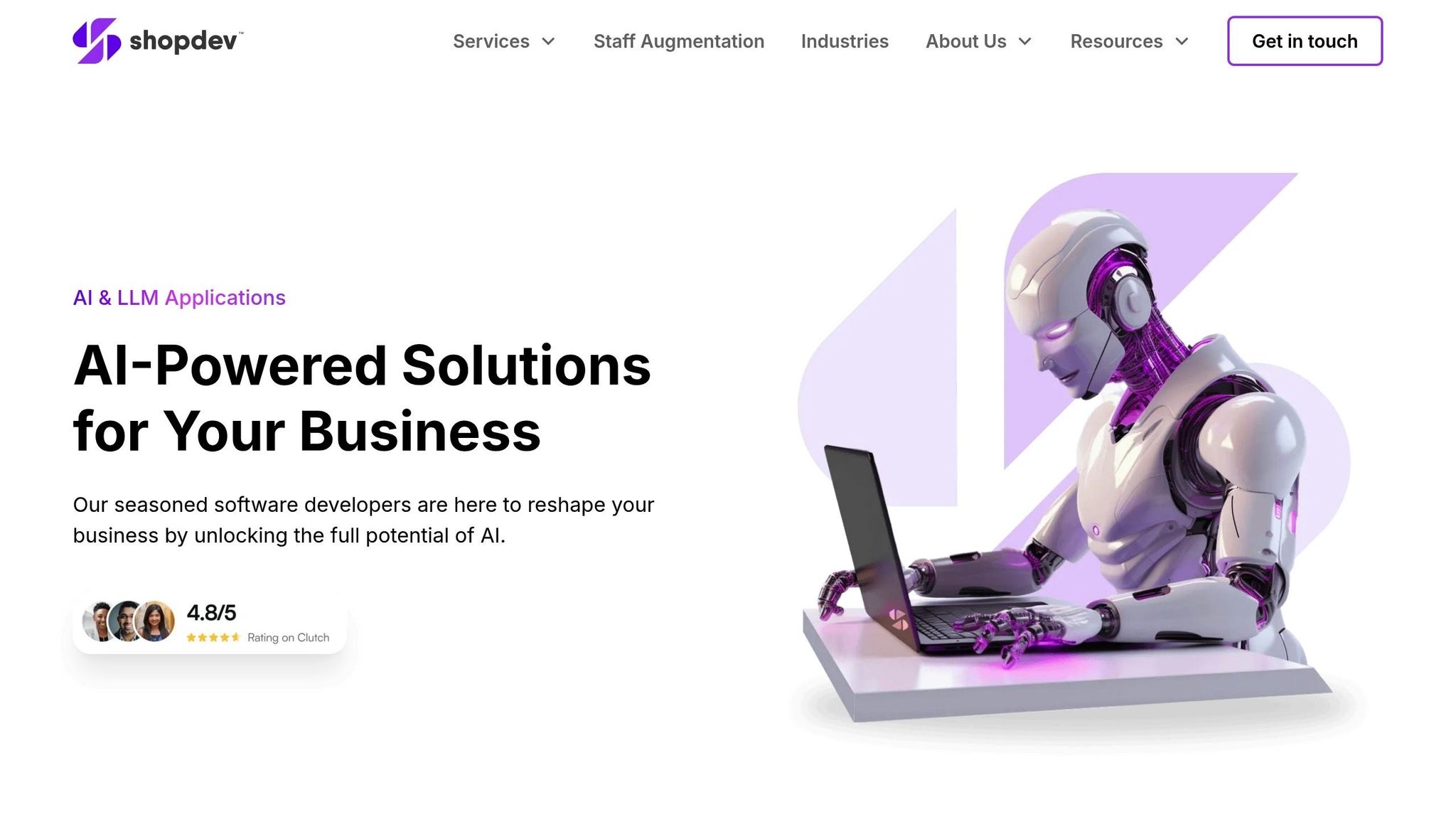
The Shopdev Shopping Assistant stands out as a powerful AI assistant tool for large e-commerce operations. Its multimodal AI technology processes product descriptions, reviews, images, and specifications simultaneously to deliver accurate results.
Natural Language Understanding
Shopdev's NLP goes beyond simple keyword matching. When a customer says "I need something warm for winter hiking," the assistant understands the full context rather than just matching individual words. This contextual understanding leads to more relevant product recommendations and higher conversion rates.
Integration and Omnichannel Support
The platform supports omnichannel shopping, bridging physical and online stores smoothly. Shoppers can start their journey on one platform and continue on another with their preferences intact. The multilingual support makes it particularly valuable for businesses serving diverse global audiences.
Shopdev's proprietary Recommendation Engine delivers highly accurate and personalized suggestions, driving better customer engagement and higher Average Order Values for top retail brands.
Customization Options
The user interface is fully customizable to match your brand identity. You can tailor the conversational tone and style to maintain consistency across all customer interactions. This level of personalization helps the AI feel like a natural extension of your business.
Pricing
Plans range from $2,500 to $8,000 per month, making Shopdev best suited for enterprise operations with high query volumes and complex product catalogs.
2. Google Assistant: The Integration Powerhouse

Google Assistant offers unmatched reach when you compare AI voice assistants across brands. With connections to over 50,000 smart devices and support for 95+ languages, it's the most versatile option for businesses targeting global markets.
Best AI Voice Assistants for Multilingual Support in Online Stores
Google Dialogflow, which powers Google Assistant's conversational capabilities, supports over 95 languages in ES and 25+ in CX. Gemini-2 enables real-time translation for more than 50 additional languages. This makes it one of the best AI voice assistants for multilingual support in online stores for 2025.
E-commerce Integration
Google Assistant integrates with major retailers like Walmart, Domino's, and Sephora. It also works with Shopify stores through specialized tools. Voice-assisted shopping grew from $4.6 billion in 2021 to nearly $20 billion in 2023, and Google Assistant has been a major driver of this growth.
Walmart reported a 15% boost in repeat purchases after implementing voice-enabled shopping through the platform.
Freemium Pricing Model
For AI companies offering freemium e-commerce options, Google Assistant's pay-per-request model ($0.006-$0.016 per request) makes it accessible for businesses of all sizes. You only pay for what you use, making it easy to test and scale.
Analytics Capabilities
The platform offers voice analytics tools that help identify common customer phrases and refine the shopping experience. This data-driven approach helps you continuously improve customer interactions.
3. Lindy: Workflow Automation for E-commerce
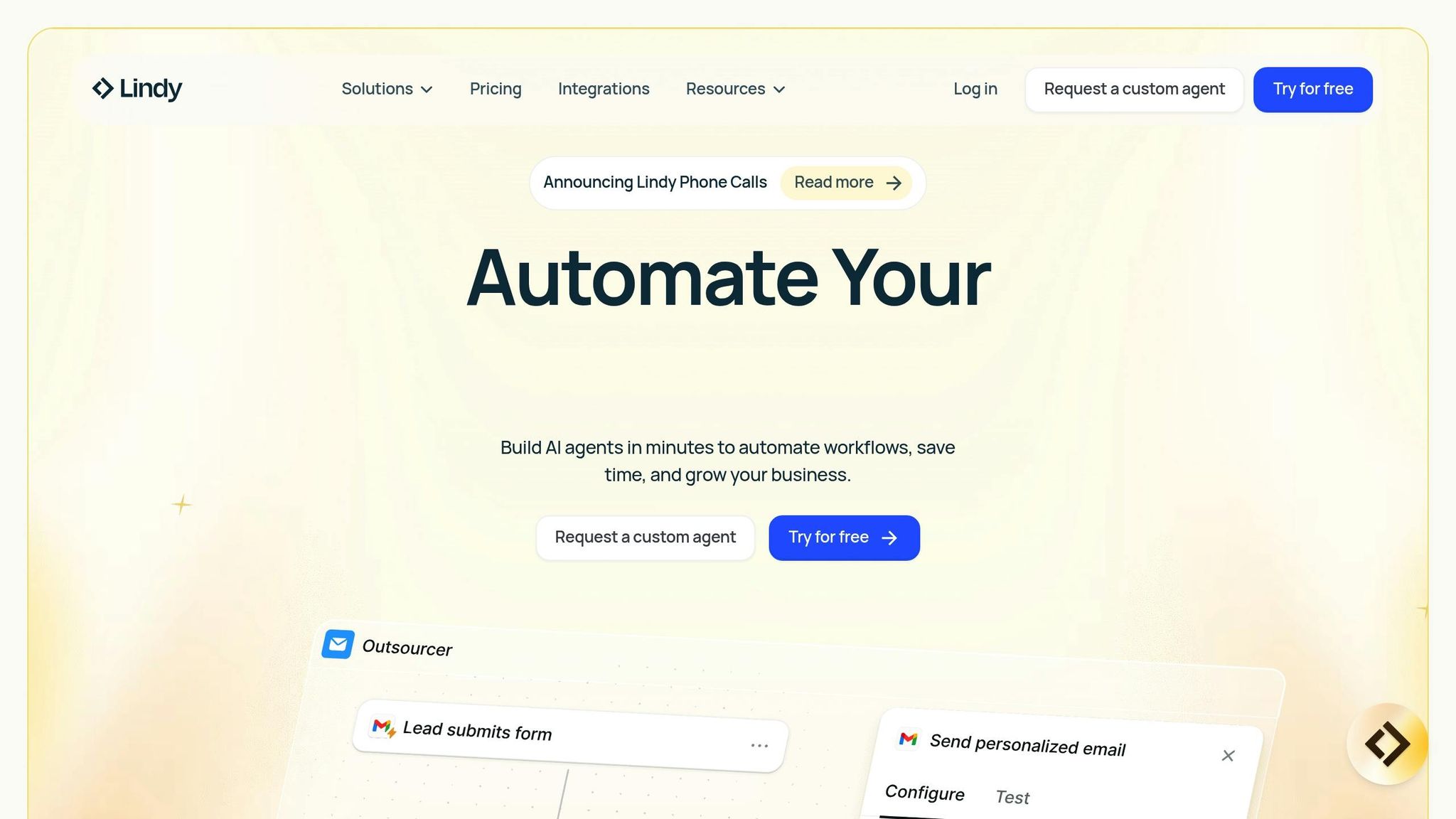
Lindy takes a different approach as an advanced AI assistant that focuses on workflow automation. Rather than just responding to queries, it proactively integrates into your business processes to simplify product discovery and customer engagement.
Conversational AI Capabilities
Lindy's NLP extracts intent from nuanced instructions and creates smooth, human-like conversations across apps, email, and support systems. With support for 13+ languages, it serves international customers effectively. The platform excels at understanding complex user commands and delivering context-aware responses.
Integration Ecosystem
The free plan connects with over 100 integrations, while the Pro plan expands to 4,000+. Lindy works well with Gmail, HubSpot, Salesforce, and Notion. For e-commerce, it pulls product data from inventory systems, handles customer inquiries via CRM platforms, and manages payment workflows.
Customization for Brand Consistency
Businesses can train Lindy to recognize specific product categories, understand industry-specific terms, and maintain a consistent brand voice. The user-friendly interface allows non-technical users to design tailored workflows, such as automating lead onboarding or tracking orders.
Pricing and Scalability
Plans range from $99 to $999 per month. The freemium model provides strong features even in the free version, making it an affordable voice genie alternative for startups. You can create specialized AI agents in minutes for product recommendations, order tracking, and customer support.
How to Compare AI Voice Assistants Across Brands: Analytics vs. Conversation
When you compare AI voice assistants across brands, you'll notice they fall into two main categories: analytics-focused platforms and conversation-focused platforms. Understanding this distinction helps you choose the right AI shopping tools for your specific needs.
Analytics-focused platforms like Polar Analytics excel at turning voice data into business insights. Conversation-focused platforms like Genie prioritize natural customer interactions. Your choice depends on whether you need better data or better customer conversations - or both.
4. Polar Analytics: Data-Driven Voice Insights
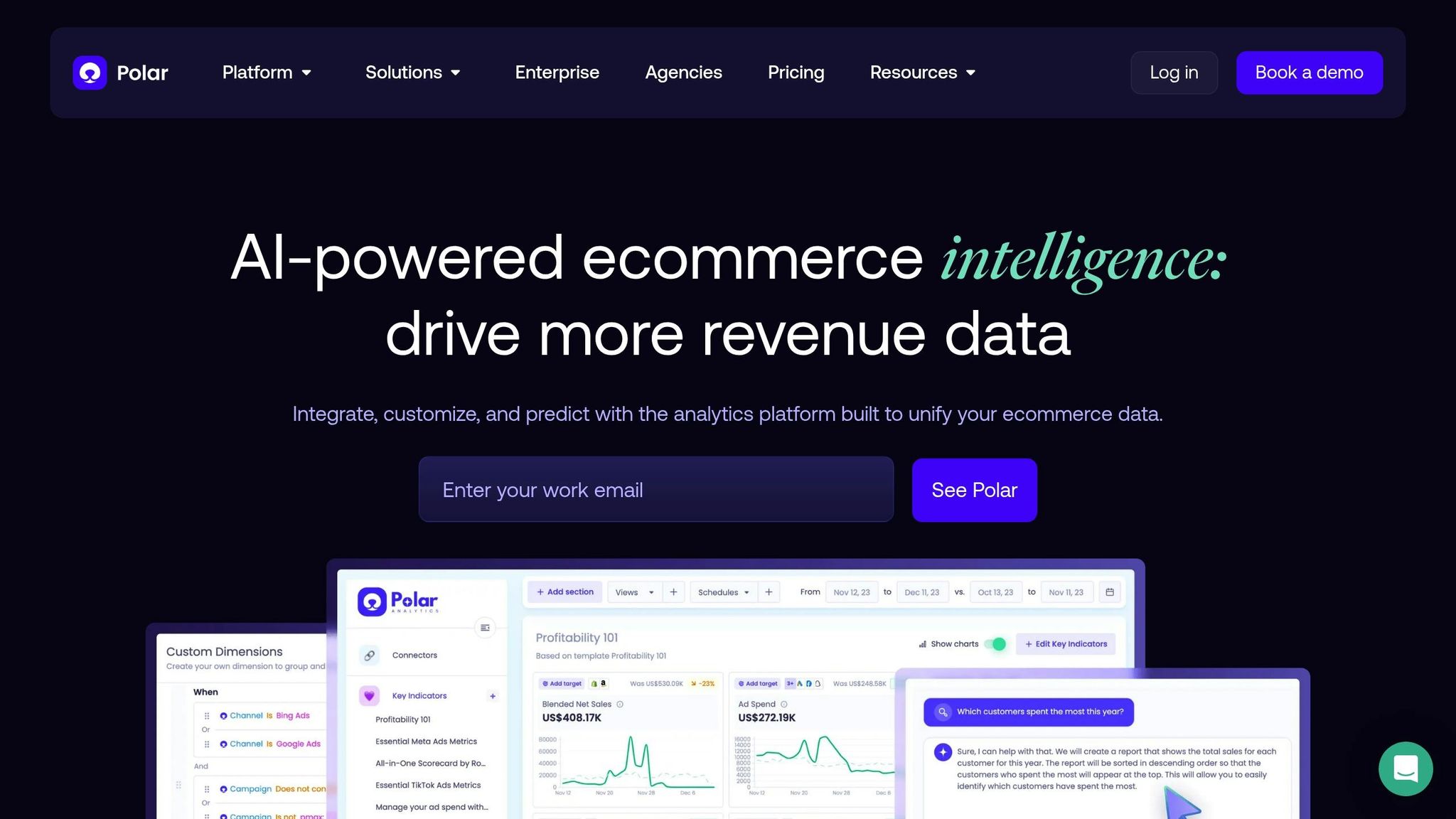
Polar Analytics serves over 4,000 e-commerce brands with its conversational AI approach to analytics. While it's not a traditional AI voice assistant for business, it uses natural language processing to make data analysis accessible through voice and text queries.
Ask Polar: Natural Language Analytics
The "Ask Polar" feature lets users create custom reports by asking questions in plain English. For example, you can ask "How did my weekly sales in August compare to July?" and receive an instant, actionable report. "Ask Polar Insights" provides deeper explanations, helping you understand not just the numbers but the story behind them.
E-commerce Platform Integration
Polar connects with 45+ e-commerce platforms through one-click integrations. It's particularly valuable for businesses managing multiple Shopify stores or operating across Shopify Markets. Yellow Pop cut its Cost per Purchase by 36% and boosted ROAS by 28% using Polar's server-side tracking.
"Polar was the only one that felt like it was designed for our business." - Dirty Labs
Customization and Reporting
The platform offers white-label reporting options for agencies and extensive dashboard customization. You can define your own metrics and customize charts to fit your specific business model.
GMV-Based Pricing
Pricing starts at $300 per month for businesses with up to $1.5M in annual GMV. This approach ensures costs scale with revenue, making it practical for both startups and enterprises.
5. Genie: AI Shopping Assistant Voice Options
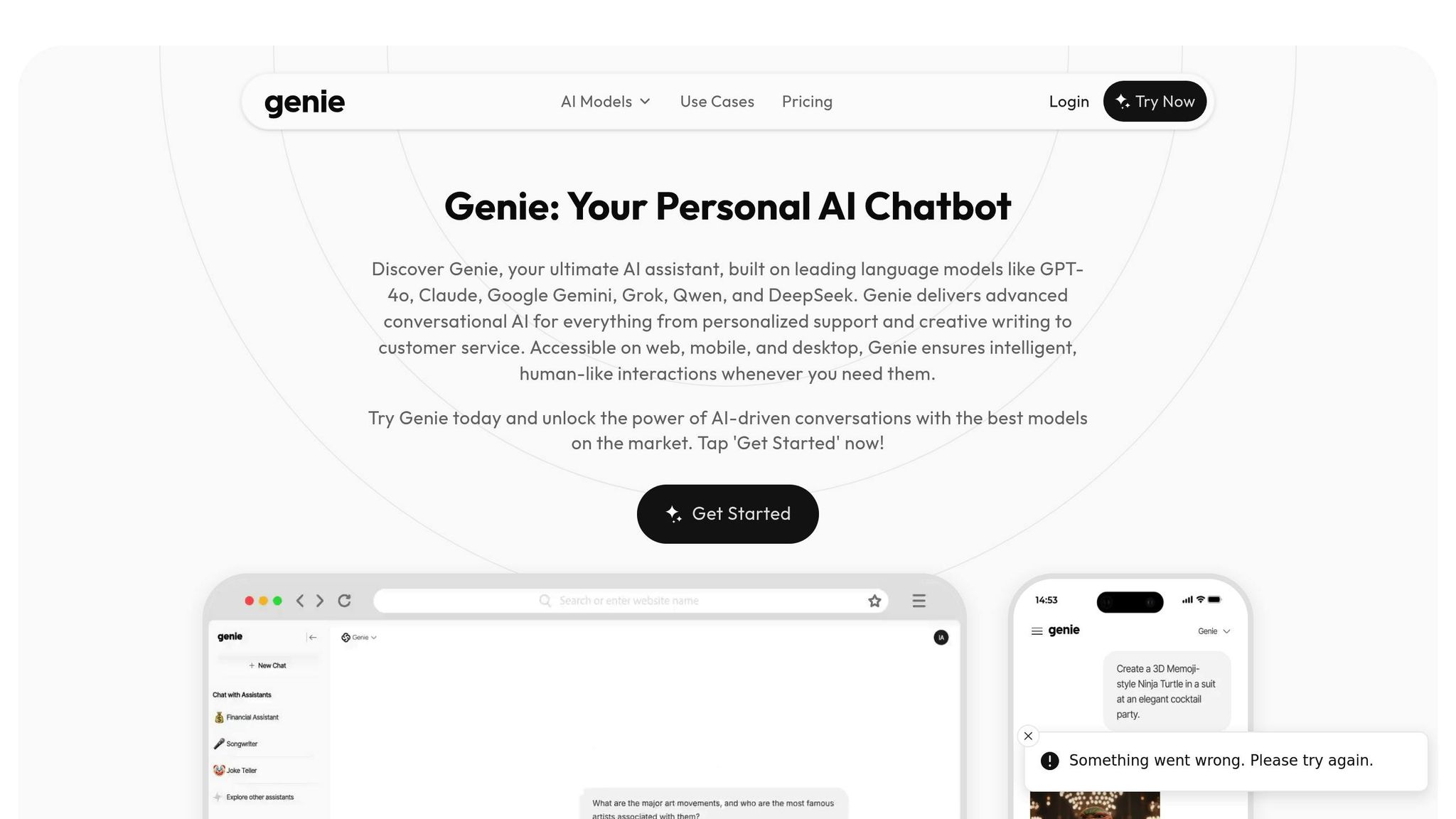
Genie, part of the Genies Orchestra suite, provides interactive two-way conversations that address common customer challenges. It's a solid alternative to Voice Genie for businesses seeking personalized recommendations and real-time support.
"Genies Orchestra redefines e-commerce with an AI voice assistant that personalizes shopping, turning browsers into buyers." - Mirror Mii Inc.
Conversational Features
Genie uses advanced NLP to understand customer questions and deliver context-driven answers. It narrates detailed product descriptions and handles queries about returns, shipping, and product care. The platform delivers real-time support while meeting accessibility standards.
Integration Capabilities
Genie connects with 1,000+ third-party tools including Go High Level, HubSpot, and Shopify. Its Shopify integration automates cart recovery, responds to product questions instantly, and gathers post-purchase feedback through automated calls.
Customization for Brand Identity
You can adjust the assistant's name, gender, accent, tone, and scripts to reflect your company's identity. This ensures Genie stays consistent with your brand voice while enhancing product navigation.
Pricing
Plans range from $150 to $750 per month, positioning Genie as a mid-tier AI shopping assistant with voice options suitable for growing e-commerce businesses.
6. Synthesia: Visual AI for Product Demonstrations
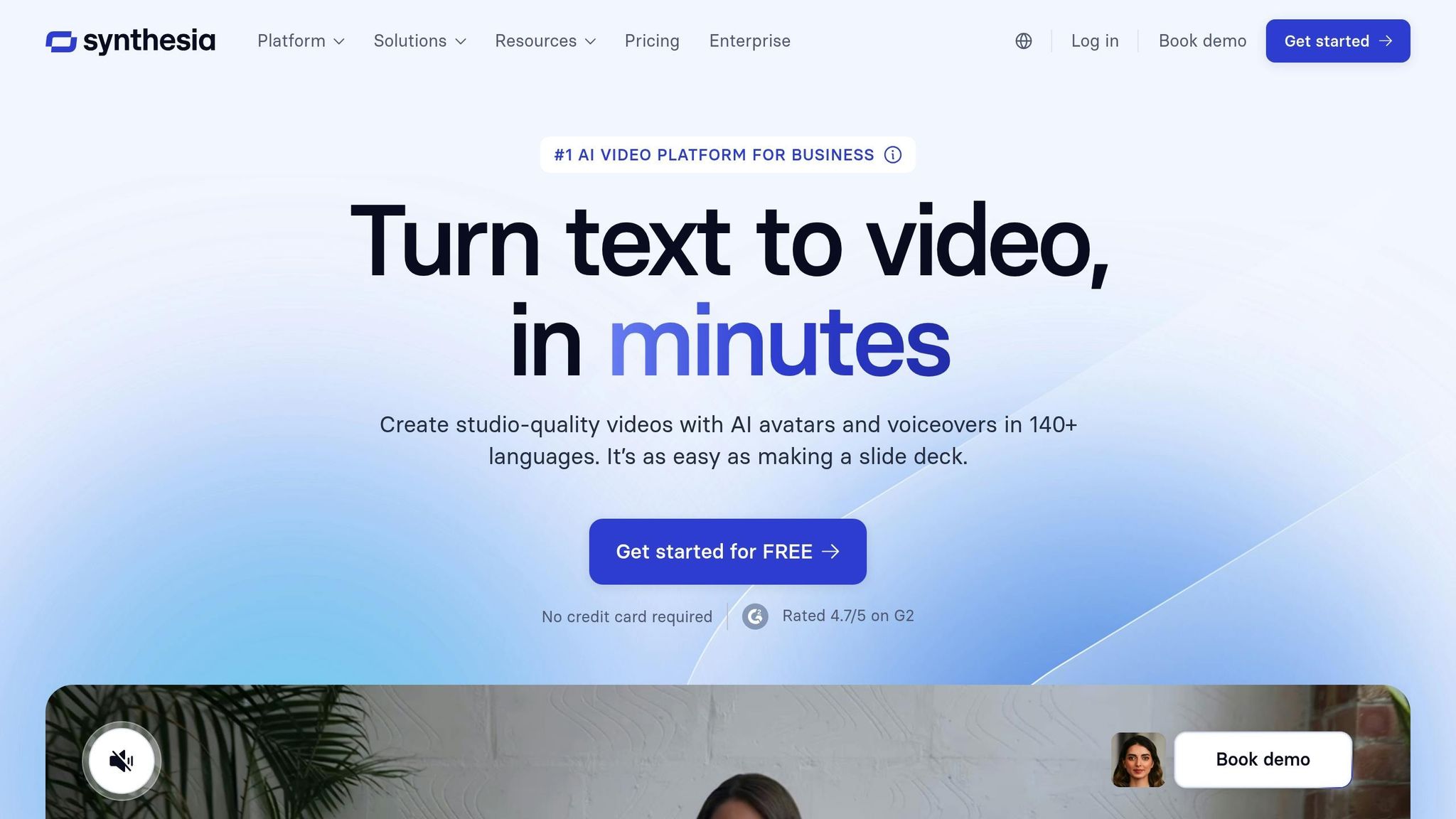
Synthesia takes a unique approach as an AI-powered video assistant. It transforms text into lifelike video content with support for 120+ languages, making it one of the best AI voice assistants for multilingual support in online stores.
Video Commerce Applications
For e-commerce, Synthesia creates product demonstrations, customer education content, and personalized video messages. Heineken used the platform to train 70,000 supply chain personnel, demonstrating its capability for large-scale customer education.
Brand Customization
The platform offers customizable brand kits with backgrounds, colors, logos, and fonts. You can create custom AI avatars as digital spokespersons. Real results include:
- BSH: 30%+ increase in e-learning engagement
- DuPont: $10,000 savings per training video
- Zoom: 90% reduction in video creation time
"Synthesia's AI voiceovers sold me instantly. They give us the ability to pivot and create video content much faster than before." - Ann Stutler, Division Maintenance Group
Pricing Tiers
| Plan | Price | Video Minutes | AI Avatars |
|---|---|---|---|
| Basic | Free | 3/month | 9 |
| Starter | $29/month | 10/month | 125+ |
| Creator | $79/month | 30/month | 180+ |
| Enterprise | Custom | Unlimited | 230+ |
More than 50,000 teams use Synthesia, including 70% of Fortune 100 companies. The platform saves teams up to 80% of their time and budget on video creation.
7. Dialzara: AI Voice Assistant for Business Phone Support

Dialzara is an AI-driven virtual phone answering service that fills a critical gap in e-commerce customer service. Research shows 60% of customers call local businesses after an online search, yet only 38% of those calls get answered. Dialzara ensures you never miss these opportunities.
Phone-Based AI Virtual Assistant
While most AI voice integration options for e-commerce platforms focus on web interactions, Dialzara handles phone calls with 99.8% transcription accuracy. The AI continuously updates its knowledge base to handle specific product questions, order inquiries, and return requests. Learn more about Dialzara's features to see how it can transform your phone support.
E-commerce Tool Integration
Dialzara integrates with Google Calendar, Gmail, Google Sheets, and CRMs like HubSpot, Zoho, Vtiger, and Pipedrive via Zapier. This simplifies scheduling, follow-ups, and call tracking. Notifications go through Twilio SMS, WhatsApp, or Textline.
Customization for Your Brand
Train the AI by uploading documents, call scripts, recordings, and website URLs. The virtual assistant learns your product catalogs, pricing structures, and policies to reflect your brand's unique customer interaction style. Explore the available AI voices to find one that matches your brand personality.
Cost-Effective Pricing
Starting at just $29 per month, Dialzara reduces staffing costs by up to 90% while operating 24/7. It scales easily with call volumes, making it an affordable voice genie alternative for startups and growing businesses. The platform handles 24/7 customer support without requiring additional staff.
Key Factors When You Compare AI Voice Assistants Across Brands
When evaluating AI voice commerce platforms for online stores, consider these critical factors:
Multilingual Capabilities
Research shows 76% of people prefer buying in their native language. Without that option, trust falls and sales slip. Here's how the platforms stack up:
- Google Dialogflow: 95+ languages
- Synthesia: 120+ languages
- Lindy: 13+ languages
- Dialzara: English and Spanish
Latency and Response Time
Production voice AI agents typically aim for 800ms or lower latency. Leading platforms achieve sub-800ms end-to-end latency, while some competitors experience delays of 3-4 seconds. Fast response times directly impact customer satisfaction and conversion rates.
Integration Depth
Consider how each platform connects with your existing tech stack. Dialzara integrates with 5,000+ business applications, while Google Assistant connects to 50,000+ devices. The right choice depends on your current tools and future needs.
Pricing Models
AI companies with freemium e-commerce options make it easier to test before committing:
- Per-minute pricing: Retell AI ($0.07+/minute), Bland AI ($0.09/minute)
- Subscription tiers: Dialzara ($29-$199/month), Lindy ($99-$999/month)
- Pay-per-request: Google Assistant ($0.006-$0.016/request)
ROI Considerations for AI Voice Assistants
Companies using modern voice AI report that 73% of callers don't realize they're talking to AI. This natural interaction quality translates to real business results:
- 30% improvement in customer satisfaction
- 35% reduction in call handling time
- 20-30% decrease in support costs
- Up to 40% cost reductions for early adopters
AI solutions typically pay off within 6-18 months, with successful projects delivering returns of 3-5x over three years. Annual maintenance costs generally range from 15-25% of the initial investment.
Choosing the Right AI Voice Assistant for Your Online Store
After you compare AI voice assistants across brands, the best choice depends on your specific business needs. Here's a quick guide:
- For enterprise-scale product navigation: Shopdev offers the most sophisticated NLP for large catalogs
- For maximum language support: Google Assistant or Synthesia provide the widest multilingual coverage
- For workflow automation: Lindy excels at customizable business processes
- For data-driven decisions: Polar Analytics turns voice data into actionable insights
- For mid-size personalization: Genie balances features and affordability
- For phone-based support: Dialzara delivers 24/7 phone support without coding
With the global AI-powered virtual shopping assistant market expected to reach $12.57 billion by 2034, now is the time to implement voice commerce. Over half of e-commerce businesses already use AI solutions, reporting revenue boosts of 5-15% from personalization.
Ready to stop missing calls and start capturing more business? Try Dialzara free for 7 days and experience how AI voice technology can transform your customer support.
FAQs
How do AI voice assistants improve customer satisfaction and drive sales in e-commerce?
AI voice assistants provide instant, tailored support around the clock. Customers get immediate help navigating product catalogs, answering questions, and receiving personalized recommendations without waiting on hold.
Features like voice-activated product searches, quick ordering, and customized suggestions make buying faster and more intuitive. This improves conversion rates and builds customer loyalty. Studies show companies using voice AI see a 30% jump in customer satisfaction scores.
What should businesses look for when selecting an AI voice assistant for e-commerce?
Prioritize solutions offering personalized experiences, strong integration with your existing systems, and the ability to scale as you grow. The assistant should provide context-aware interactions and adapt to customer preferences.
Evaluate integration ease, conversational AI sophistication, and budget fit. Features like multilingual support and the ability to handle high volumes without losing quality significantly improve the shopping experience. Check our FAQs for more guidance on choosing the right solution.
How do AI voice assistants integrate with e-commerce platforms?
AI voice assistants connect with e-commerce platforms through APIs, enabling real-time communication and data sharing. They integrate with platforms like Shopify, Magento, and WooCommerce to handle customer questions, assist with product searches, and process orders.
By using customer data, these assistants offer tailored product recommendations, optimize marketing strategies, and simplify logistics. This helps businesses increase sales and cut costs while creating more engaging shopping experiences.
What are the best alternatives to Voice Genie for startups?
For startups seeking affordable voice genie alternatives, consider Dialzara (starting at $29/month), Synthesia's Starter plan ($29/month), or Lindy's freemium tier. These options provide strong AI voice capabilities without enterprise-level pricing, making them accessible for businesses just getting started with voice commerce.
External References
Summarize with AI
Related Posts
How to Add Voice AI to Shopify Customer Support
Integrating Voice AI into Shopify transforms customer support by ensuring 24/7 availability and significant cost savings, enhancing overall efficiency.
Optimizing AI Voice Assistant for Small Businesses
Explore strategies for customizing and implementing AI voice assistant technologies to empower SMBs, harnessing AI-powered voice assistants for small business efficiency, selecting the best AI voice assistant, and tailoring AI voice assistant for enhanced business operations.
How Voice AI Automates Customer Service
Explore how Voice AI enhances customer service with cost savings, efficiency, and 24/7 support for businesses of all sizes.
AI Voice Assistants in Retail: How They Work
Explore how AI voice assistants enhance retail by personalizing shopping experiences, improving efficiency, and balancing automation with human support.
